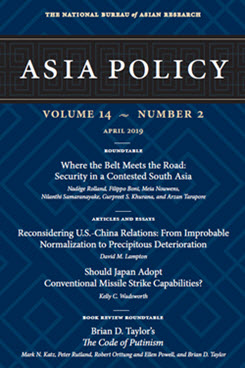Should Japan Adopt Conventional Missile Strike Capabilities?
This article evaluates the three strongest arguments in favor of Japan obtaining an independent conventional missile strike capability: rising regional threats, the country’s right to defend itself from such threats, and the potential to make a stronger contribution to the U.S.-Japan alliance.
EXECUTIVE SUMMARY
MAIN ARGUMENT
With North Korea’s growing nuclear capabilities and China’s increasing military assertiveness in the Asia-Pacific, the issue of Japan’s right to defend itself via a conventional first-strike capability has regained salience in the security discourse. High-level interviews and in-depth analysis, however, show that the main three arguments for Japan to seek an offensive strike capability are not justifiable in the current political and economic environments. First, developing a conventional missile strike capability is not a practical solution for Tokyo to abate the North Korean threat, and the move could be perceived by Beijing and Seoul as aiding a U.S. strategy of containment. Second, the current political restrictions on the Japanese defense budget would not practically allow the buildup of the military capability required for a conventional missile strike force, and this restriction cannot be changed without support from a military-wary public. Finally, though the U.S.-Japan alliance may be unbalanced in terms of capabilities, the U.S. should consider its broader interests in regional stability. A strike-capable Japan may not only escalate tension in an already tense relationship with China, it also could elicit a harsh response against Tokyo and Washington. This could challenge the credibility of the U.S. “nuclear umbrella,” potentially leading to increased militarization throughout Asia.
POLICY IMPLICATIONS
- If the conditions surrounding any of the three arguments examined in this article change—for example, if the actions of the U.S. discredit its reliability to protect Japan under the alliance, if Japanese public support allows an increase in the Japan Self-Defense Forces’ budget, or if the U.S. can no longer maintain credible military deterrence in the East Asian region—Japan would have a strong argument to move forward with conventional missile strike capabilities.
- Both Tokyo and Washington should exercise discretion in their public communications of any planned alliance cooperation on Japan’s move toward conventional missile strike capabilities. Hawkish suggestions of the potential to increase U.S. or Japanese dominance in the region should be avoided.
Kelly C. Wadsworth is a PhD student in International Security Studies at the University of Pittsburgh. Her research focus is on nonproliferation and regional stability in East Asia, highlighting the evolving situation in North Korea. Ms. Wadsworth earned an MBA and an MA in International Studies (Korea Studies) at the University of Washington.
About Asia Policy
Asia Policy is a peer-reviewed scholarly journal presenting policy-relevant academic research on the Asia-Pacific that draws clear and concise conclusions useful to today’s policymakers. Asia Policy is published quarterly in January, April, July, and October and accepts submissions on a rolling basis. Learn more


